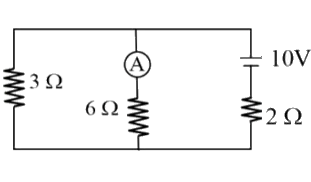The resistance of an ideal ammeter is
low
zero
high
infinite
The correct Answer is:B
Step by step video, text & image solution for The resistance of an ideal ammeter is by Physics experts to help you in doubts & scoring excellent marks in Class 12 exams.
Updated on:21/07/2023Topper's Solved these Questions
- MAGNETIC EFFECT OF ELECTRIC CURRENTBOOK - NIKITA PUBLICATIONCHAPTER - MAGNETIC EFFECT OF ELECTRIC CURRENTEXERCISE - MCQs (Sensitivity and accuracy of M.C.G.)
1 Videos
- KINETIC THEORY OF GASES & RADIATION BOOK - NIKITA PUBLICATIONCHAPTER - KINETIC THEORY OF GASES & RADIATION EXERCISE - MCQs (Question Given in MHT-CET)
79 Videos
- MAGNETISM BOOK - NIKITA PUBLICATIONCHAPTER - MAGNETISM EXERCISE - MCQs
249 Videos
Similar Questions
Knowledge Check

Assertion : In the circuit shown in figure ammeter and voltmeter are non-ideal. Why positions of ammeter and voltmeter are changed, reading of ammeter will increase while of voltmeter will decrease.
Reason : Resistance of an ideal ammeter is zero while that of an ideal voltmeter is infinite.AIf both Assertion and Reason are true and the Reason is correct explanation of the Assertion.BIf both Assertion and Reason are true but Reason is not the correct explanation of Assertion.CIf Assertion is true, but the Reason is false.DIf Assertion is false but the Reason is true.Assertion (A) : An ammeter is connected in series of the current carrying circuit but a voltmeter is connected in parallel across those two points, potential difference between which is to be measured.
Reason (R) : Resistance of an ideal ammeter is zero but the resistance of an ideal voltmeter is infinite.AIf both assertion and reason are true and the reason is the correct explanation of the assertion.BIf both assertion and reason are true but reason is not the correct explanation of the assertion.CIf assertion is true but reason is false .DIf the assertion is false but reason is true.The reading of the ideal ammeter will be (Resistance of ideal ammeters is zero)
 A5/6 ampereB6/5 ampereC3/2 ampereD2/3 ampere
A5/6 ampereB6/5 ampereC3/2 ampereD2/3 ampere
What is the resistance of ideal ammeter and ideal voltmeter?
View SolutionWhy should the resistance of an ideal voltmeter be infinite and of ideal ammeter be zero?
View SolutionA charged capacitor of unknown capacitance is connected in series with 100kΩ resistance and an ideal ammeter. The initial current in the circuit is found to be 0.2mA and the current after 7 sec is found to be 0.1mA. The potential energy that was stored in the capacitor before it was connected in the circuit is ______mJ. [Take log22=0.7]
View SolutionThe resistance of a galvanometer is 100Ω. A shunt of 5Ω is connected to it to convert it into an ammeter. The internal resistance of the ammeter is
View SolutionFive identical lamps , each of resistance 1100Ω are connected to 220V The reading of an ideal ammeter A is

View Solution
